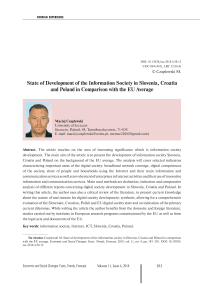State of development of the information society in Slovenia, Croatia and Poland in comparison with the EU average
Автор: Czaplewski Maciej
Журнал: Economic and Social Changes: Facts, Trends, Forecast @volnc-esc-en
Рубрика: Foreign experience
Статья в выпуске: 4 (58) т.11, 2018 года.
Бесплатный доступ
The article touches on the area of increasing significance which is information society development. The main aim of the article is to present the development of information society Slovenia, Croatia and Poland on the background of the EU average. The analysis will cover selected indicators characterizing important areas of the digital society: broadband network coverage, digital competences of the society, share of people and households using the Internet and their main information and communicationservicesaswellasinvolvementofenterprisesin Internetactivitiesandtheiruseofinnovative information and communication services. Main used methods are deduction, induction and comparative analysis of different reports concerning digital society development in Slovenia, Croatia and Poland. In writing this article, the author uses also a critical review of the literature, to present current knowledge about the nature of and reasons for digital society development, synthesis, allowing for a comprehensive evaluation of the Slovenian, Croatian, Polish and EU digital society state and an indication of the primary current dilemmas. While writing the article the author benefits from the domestic and foreign literature, studies carried out by institutes in European research programs commissioned by the EU as well as from the legal acts and documents of the EU.
Information society, internet, ict, slovenia, croatia, poland
Короткий адрес: https://sciup.org/147224073
IDR: 147224073 | УДК: 004 | DOI: 10.15838/esc.2018.4.58.12
Текст научной статьи State of development of the information society in Slovenia, Croatia and Poland in comparison with the EU average
In the era of the growing role of the Internet in the development of individual economies, the use of this medium in social and economic life is gaining importance, translating into the level of development of the information society. The aim of the article is to present the level of information society implementation in three selected EU countries: Slovenia, Croatia and Poland. To achieve this goal, the author conducted a comparative analysis of key indicators characterizing the essential information society areas: broadband network coverage, digital competences of the society, participation of individuals using the Internet and their main information and communication services, enterprises’ involvement in online activities and innovative information and communication services used by enterprises as well as the development of e-government services. In order to show those areas, data from the years 2010–2017 were used.
In addition to direct comparisons of selected indicators achieved by the three countries studied, a comparison of these achievements with the EU average was also made. This approach allows to indicate in which areas Slovenia, Croatia and Poland are closest to the average EU indicators, in which they are located above, and in which they have the most to catch up in relation to the EU average. After indicating the areas where the situation of the three countries surveyed does not fall out favorably, the author proposed actions that will accelerate the process of catching up perceived delays.
The essence of the information society
The modern world undergoes significant social and economic changes. Their significance as well as their influence on the functioning of societies and businesses cause that the existing models of life will change fundamentally.
Researchers are trying to define this form of social and economic development and determine the extent of possible consequences. It is known that the approaching transformation is a very complex problem and is connected with the changes that society makes in terms of “world views, basic values, social and political structure, arts and key institutions”[1, p. 1]. Thus, the changes taking place concern all spheres of human life.
In literature the factors that have become the causative forces of transformations covering the whole globe are characterized differently. However, probably the most known is the view of A. Toffler, who presented the theory of three civilization waves (agricultural, industrial and postindustrial) [2, p. 48]. A similar theory is described by D. Bell. According to this author economic development of the society proceeded as follows [3, p. 19]:
– pre-industrial society, based on simple occupations of a fisherman, hunter and farmer fighting with nature, using the potential of nature,
– industrial society, organized primarily around the process of using energy to produce goods,
– post-industrial society, based on information, as a foundation for knowledge and action.
The theories of social evolution described above are mutually coherent and ideologically close. They do not raise fundamental controversies and are widely accepted by scientific authorities dealing with the discussed issues. On the other hand, the choice, characteristics and assessment of factors determining and conditioning the evolution of society remain a controversial issue.
Most of the considerations addressing this problem involve the development of human civilization with a real increase in knowledge.
It seems obvious that with the increase of knowledge, since the dawn of history, man has been able to solve increasingly complex existential problems. This is confirmed by K. Popper who writes that “the course of history depends on the level of development of knowledge” [4, p. 224]. So the faster the knowledge is acquired, the faster and the greater the scope of the changes that occur.
In this respect, the technology itself is very important. And thus, the very impact of technology as a factor conditioning social progress is evident in all conceptions. It can be assumed, therefore, that the “technical devices have naturally changed man’s customs and modified the structure and functions of the society” [5, p. 135]. The discussion basically concerns the problem whether technology determines changes or enables them only [6, p. 129].
The civilization that is being created nowadays is a completely new quality, which is being defined differently. Apart from the most known terms, such as the knowledge society, postindustrial, network or third wave in literature, a number of more or less accurate terms can be found. The most famous are:
– digital society,
– telematic society,
– a society of information overload,
– technological society.
Yet, the term information society has gained most widespread acceptance.1 The essence of this term and the philosophical approach represented by them is the conviction that information understood as “everything that can be used for a more efficient choice of activities leading to a certain goal” [8, p. 17], in economic, scientific (and eventually also in cultural) sense becomes the basic determinant of society functioning and development.
However, it seems to be too far-reaching, because society has always been informative and information over the centuries was an important factor determining the success of existential, commercial or military projects, regardless of the level of development of societies. Its efficient acquisition, transmission, storage and proper use has been a very important element of the activities of individuals and communities. However, the information could not properly “exist in a world without proper media that would allow it to express it” [9, p. 25]. Only today, as a result of the development of telecommunications, IT and media technology, information has become a more accessible, cheaper and, above all, more current good. Considering also the fact that information is “the only resource that grows with use, instead of exhausting” [10, p. 71], wide access to information of a different nature allows both business and individual units to make decisions based on a large number of factors.
Summarizing, despite the awareness of the importance and the role of knowledge in modern world, it is necessary to recognize the universality of information present in all dimensions of reality and to emphasize its original character. This conclusion causes that in this article the term information society will be used which, in the author’s opinion, most fully reflects the meaning of the phenomena that are defined. In addition, the name contains some characteristic features of social and economic changes, and in particular the change of work on products processed from natural resources to the processes of creating and storing information. The literature on the subject presents a number of definitions explaining the concept of information society.
Those are as follows:
– a society that has the possibility of extensive access to information, services and entertainment on demand, the ability to interact and freely operate data, the ability to perform various remote operations and commence communication at any time and from any place of the world connected to the virtual world via telecommunications networks [11, p. 11];
– a society in which the quality of life as well as the prospects for economic and social development depend increasingly on IT and its use. In such a society, the standards of living, working and spending free time, the education system and the economy depend on progress in the field of information [12, p. 19];
– a society that not only has well-developed means of information processing and communication, but information processing is the basis for creating national income and provides the livelihoods of the majority of society [13, p. 43];
– a society that achieves the degree of development as well as the scale and complexity of social and economic processes that require the use of new techniques for collecting, processing, transmitting and using the huge mass of information generated by these processes. In such a society:
-
• information as well as the resulting knowledge and technologies are a basic factor in the production, and the use of ICT is a comprehensive development factor,
-
• the workforce consists mainly of information workers,
-
• the majority of gross national income arises within the broadly understood information sector [14].
To sum up, it should be stated, that the information society is a „being” based on technologically advanced electronic com- munication, determining universal access to information.
The transformation associated with the emergence of the information society fundamentally changes the rules of the civilization functioning in all (or at least in many) aspects. As a consequence, “certain branches of industry are falling, old models of life are disappearing and new ones appear on their place immediately” [15, p. 19].
Main areas and directions of evaluation of the information society
The contemporary process of shaping the information society is multidimensional. However, we can determine the forces that have a major impact on its development. The most important ones are the following [16]:
– technical and technological progress of the information technology industry,
– changes in economic and business structures,
– state and supranational structures policy,
– interest groups – producers and information technology operators, virtual communities.
The characteristics of the information society are:
– highly developed services sector, primarily the modern services sector (banking, finance, telecommunications, IT, R & D and management), in some countries in this sector more than 80% of professionally active people work, whereas the traditional services sector exceeds slightly 10%;
– knowledge-based economy;
– high level of society enrollment;
– high level of functional alphabetism in society;
– progressive process of decentralization of society;
– renaissance of the local community;
– diversifying social life;
– influences the empowerment of society and thus the creation of an open society [17].
As we can see the potential for information society development depends on many factors. However, this article is mainly based on the EU approach to measure the present progress achieved by Member States in the field of digitization. It combines quantitative data provided under the Digital Economy Indicator and Digital Society (DESI)2 with qualitative information on policies implemented by individual countries. Additionally some data on the economic development as well as on the main characteristics of each studied country has been taken into consideration.
The DESI approach takes under consideration five dimensions:
-
1) Connectivity;
-
2) Human Capital;
-
3) Use of Internet;
-
4) Integration of Digital Technology;
-
5) Digital Public Services.
The first dimension – connectivity – measures the deployment of broadband infrastructure and its quality. It distinguishes fixed and mobile broadband and evaluates its speed and prices. It’s a basis for all other dimensions due to the fact that access to fast broadband-enabled services is a necessary condition for competitiveness.
The second dimension is connected with human capital and in general with digital skills of individuals. In that way this dimension allows to measure the skills needed to take advantage of the possibilities offered by information society. Such skills go from basic user skills that enable individuals to interact online and consume digital goods and services, to advanced skills that empower the workforce to take advantage of technology in order to enhanced productivity and economic growth.
The third dimension – the use of Internet – accounts for the variety of activities performed online by citizens. Such activities range from consumption of online content (videos, music, games, etc.) to modern communication activities, online shopping and electronic banking.
Business digitization and e-commerce is measured by the next dimension. The Integration of Digital Technology shows the digitization of businesses and their exploitation of e-commerce and in general online sales channels. It starts with the assumption that digital technology can enhance efficiency of companies, reduce costs and better engage their customers, collaborators and business partners and let a better access to wider markets and potential customers.
The last dimension connected with digital public services embraces the level of digitization and modernization of such services, focusing on e-Government. This, in turn, is associated with the assumption that than higher the number and quality of digitalized public services than higher the efficiency gains for all participants (public administration, citizens and businesses).
Indicators used in all DESI dimensions have an objective approach mostly due to the fact that they have to fulfill various requirements. First of all they are being collected with a predefined regularity. Additionally all of them embraced in the index must be accepted as relevant metrics in their specific policy areas and also cannot be redundant in any way.
However, also an important impact in this regard is the size of the national economy itself. One of the most important measures indicating
Main characteristics of Slovenia, Croatia and Poland by GDP, GDP per capita, number of inhabitants and area size of each country at the end of 2016
|
Country |
GDP (in millions of dollars) |
GDP per capita (in international dollars) |
Inhabitants |
Area size (in km2) |
|
Slovenia |
44009 |
32216 |
2,079,976 |
20273 |
|
Croatia |
50441 |
22937 |
4,189,353 |
56594 |
|
Poland |
467591 |
27690 |
38,170,712 |
312685 |
|
Source: Own compilation on the base of [19; 20, 21]. |
||||
the level of economic development of the country is the GDP as well as the GDP per capita. Other data which allows us to compare Slovenia, Croatia and Poland are the number of inhabitants and the size of each country. The data on this subjects for the year 2017 in the countries studied are presented in Table.
It is clearly visible that the GDP of each of the studied Balkan countries is almost ten times lower than the Polish one, but taking into account the number of inhabitants – the GDP per capita is highest in Slovenia and lowest in Croatia (with Poland standing right in the middle between those two countries). However, these numbers are fairly comparable which cannot be said about the size of the studied countries, where Poland is far bigger than the other ones.
Mentioning the similarities of the countries studied, we should indicate that all have their own socialist past and that all of them joined the EU. However, Slovenia and Poland almost 10 years earlier than Croatia (respectively in 2004 and 2013).
This short parallel let us build a base for the proper comparison and assessment of the development of information societies in each country.
Assessment of information society development status in Slovenia, Croatia and Poland
In order to evaluate the information society in the studied countries we should first of all compare the development of the infrastructure and broadband internet coverage. Figure 1
shows data about broadband and NGA broadband coverage in the examined countries on the background of EU.
At the end of 2016, Croatia and Poland was still behind the most European countries in all coverage groups while Slovenia was even or above the EU average. The differences in the examined countries coverage were even more visible within NGA broadband availability.3
Figure 2 shows individual fixed and mobile technologies coverage respectively in Slovenia, Croatia and in Poland on the background of the EU average at the end of 2016.
As it was depicted in figure 2 DSL was the most widespread fixed broadband technology. Respectively it was reaching 95,8% Slovenian, 94.9% Croatian and 75,7% Polish homes. The Balkan countries DSL coverage was slightly above the EU average (which was 94,3%), but Poland lag far behind with only 75,7%.
According to the figures Slovenia coverage was higher than the average EU level in almost all types of technologies (except for WiMAX). Especially visible is in this regard the twice higher coverage by Fiber-to-the-Premises reaching over 50%. At the same time the two other researched countries had a coverage around 15%. Moreover Croatia is behind in term of LTE technology deployment.
In general, according to the Digital Scoreboard Report, on connectivity, the highest
Figure 1. Coverage by technology 2016 in Slovenia, Croatia, Poland and the EU average
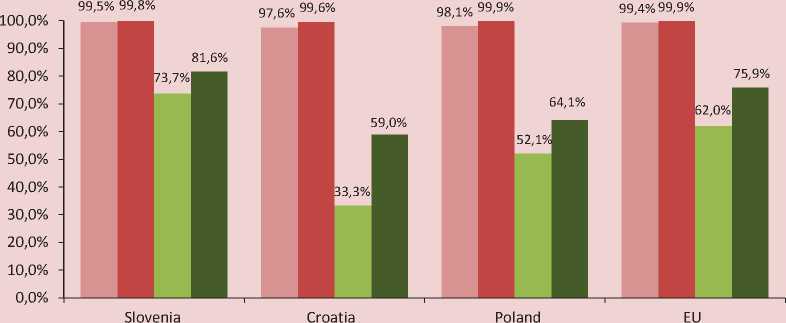
■ Overall broadband 2013 ■ Overall broadband 2016
■ NGA broadband 2013 ■ NGA broadband 2016
Figure 3. People who use Internet at least once per week in 2015–2017
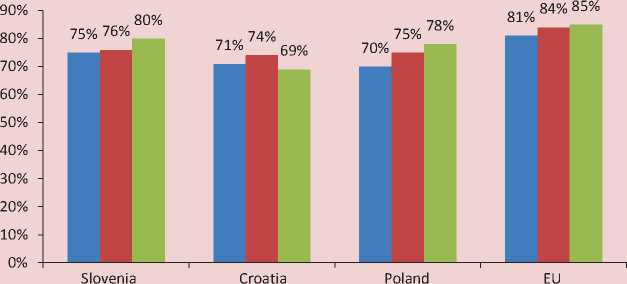
Source: Own elaboration on the base of [25].
Figure 4. Basic digital skills in 2015 and 2016
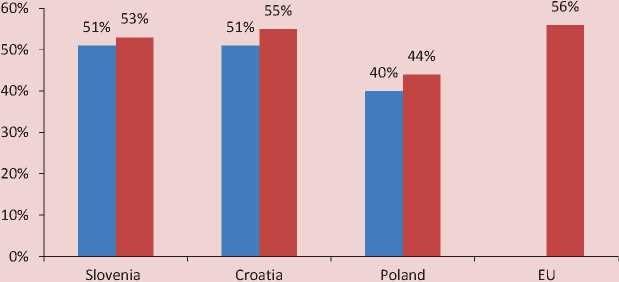
■ 2015
■ 2016
Source: Own elaboration on the base of [26; 27].
Figure 5. Employed ICT specialist (in % of the total population) in 2015–2017
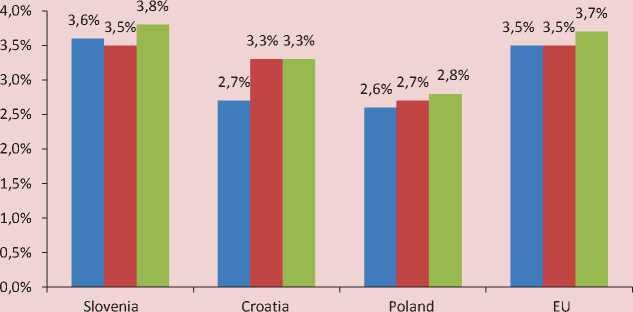
■ 2015
■ 2016
■ 2017
Source: Own elaboration on the base of [28].
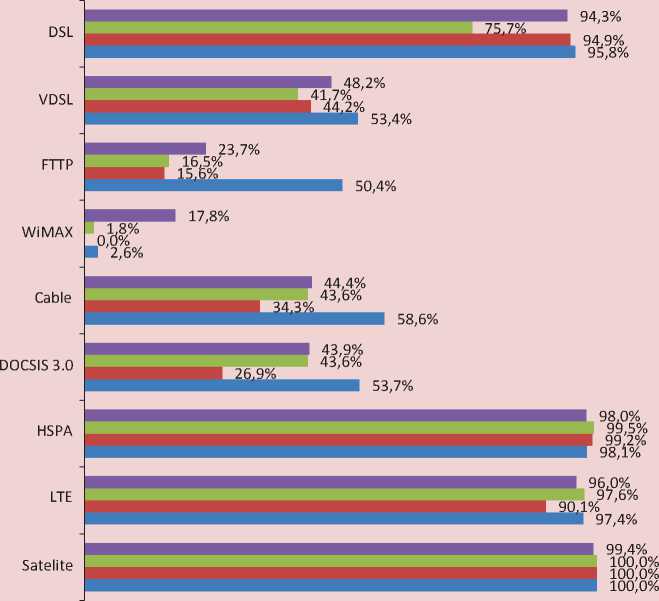
score in 2016 achieved Netherland followed by Luxembourg and Belgium. On the other hand in Croatia, Bulgaria and in Poland the weakest performance regarding broadband infrastructure was registered.
Infrastructure is a basic condition for creating information society in each country. However very important are also the factors described as readiness and will to use Internet as well as digital skills of individuals. Data on those issues are shown in figures 3, 4 and 5.
Poland and Croatia are lagging behind in all three presented aspects. Additionally Poland is far away regarding basic digital skills (understood as skills that enable individuals to interact online and consume digital goods and services) and the percentage of ICT specialist employed. Only Slovenia is slightly above the EU average in terms of ICT specialist in the workforce.
Moreover, we should mention about STEM4 graduates in each of the countries. In 2014 in Slovenia there were 19 graduates per 1000
individuals aged between 20-29. Poland had the same number and Croatia just 2 less. So all the three countries are within the EU average which amounts also to 19 graduates per 1000 individuals.
Before depicting the next dimension – the use of Internet – we should mention that in 2017 around 79% of Europeans went online regularly (which means at least once per week). It is a result that is 3 percentage points higher compared with the previous year [26]. However 44% of Europeans still do not have basic digital skills.
The use of Internet embraces different activities performed online by citizens. Such activities range from consumption of online content (videos, music, games, etc.) to modern communication activities, online shopping and electronic banking. Figures 6, 7 and 8 show some data regarding those issues in 3 studied countries.
Regarding the use of Internet its clearly visible that all three countries are circling
-
Figure 6. Use of Internet content – news, music, videos and games (% individuals who used Internet in the last 3 months) in 2017
100%
90%
0%
80%
70%
60%
50%
40%
30%
20%
10%

Slovenia
91%

Croatia

Poland

■ News ■ Music, videos and games
Source: Own elaboration on the base of [26].
-
Figure 7. Use of Internet communication – Video calls and social networks (% individuals who used Internet in the last 3 months) in 2017
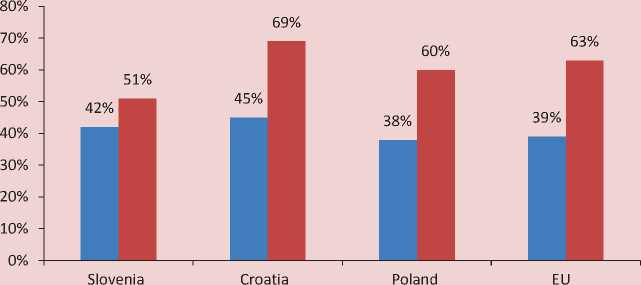
I ■ Video calls ■ Social networks
Source: Own elaboration on the base of [26].
-
Figure 8. Use of Internet for transactions – online banking (% individuals who used Internet in the last 3 months) and electronic shopping (% internet users) in 2017
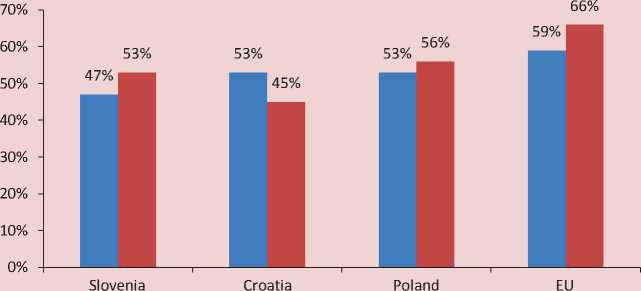
■ Banking ■ Shopping
Source: Own elaboration on the base of [26].
around the EU average. Slovenia and Poland are lying behind EU average while Croatia is slightly above it in terms of use of Internet communication. On the other hand all three countries are above the EU average regarding the use of Internet content. Especially Croatians are more active Internet users and especially they like to read news, listen to music, play games or watch videos and movies online. However, they engage less in eBanking and eCommerce than Poles. In Slovenia the number of internet users engaged in online activities remains low, especially for eBanking. In general Croatia seems to be the leader within the researched countries in the “use of Internet” category.
If we look at the supply side of the market, we can see that also businesses are adopting
Figure 9. Business digitalization and integration of digital technology
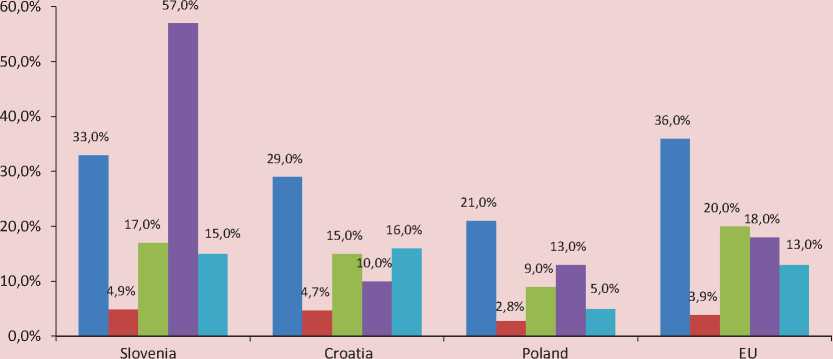
■ Electronic information sharing ■ RFID
■ Social Media ■ e-Invoices
■ Cloud solutions
Source: [26].
Figure 10. E-commerce turnover of small and medium enterprises (in 2016) comparing to large enterprises (in 2015)
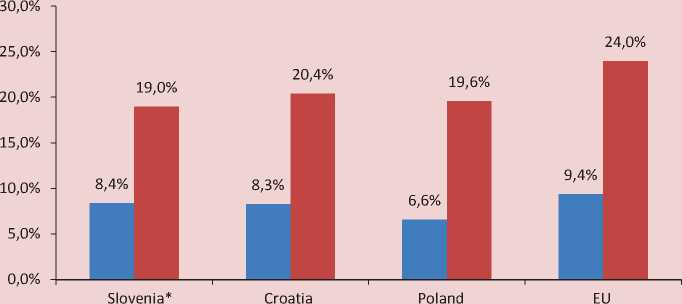
■ SME ■ Large companies
* Data for Slovenia from 2015
Source: Own elaboration on the base of [26].
various ICT technologies in order to improve its productivity and cost structure. Sharing electronic information, RFID5, e-invoicing, social media and cloud solutions are among the most significant. Data on the use of these technologies in 2017 in Slovenia, Croatia,
Poland on the background of the EU average are shown in Figure 9.
One of the main areas of digital development is the introduction of online sales especially in SMEs. Figure 10 shows e-commerce turnover of small and medium enterprises comparing to large enterprises.
-
Figure 11. E-government users
40%
35%
30%
25%
20%
15%
10%
5%
0%
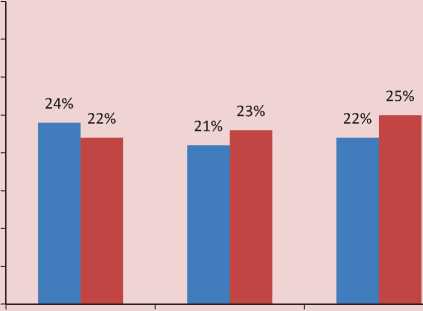
Slovenia
Croatia
Poland
I ■ 2015 ■ 2017
34%

Source: Own elaboration on the base of [26].
Figure 12. E-government service sophistication regarding digital public services
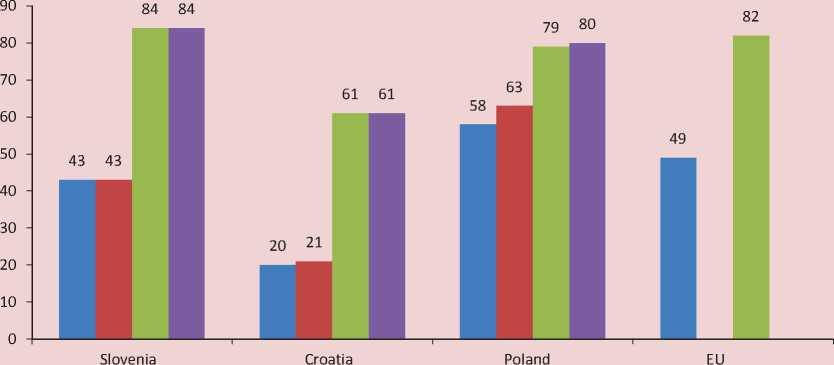
■ Pre-filled forms 2017 ■ Pre-filled forms 2015
■ Online service completion 2017 ■ Online service completion 2015
Source: [26].
It’s quite obvious that Slovenian companies have significantly upgraded their efforts in terms of digitalization, especially in terms of e-invoicing as well as in the number of enterprises engaging in cross-border online trade. Meanwhile, Croatia has also done a progress but much slower. Companies from this country are above average users of Cloud Services while online sales data are increasing. Unfortunately Polish businesses are lagging behind in terms of used and implemented technologies as well as in ecommerce.
The data on e-government and digital public services for the three researched countries look as it is depicted in figures 11 and 12 .
Looking at the data we can conclude that the take-up of E-government in Slovenia remains relatively low in comparison to the EU average. Additionally the delivery of online public services has not progressed since 2015. Croatia’s performance in the field of Open Data availability is only at EU average. On one hand the number of E-government users is increasing but on the other hand there is almost no progress within the delivery of such services. We can observe a similar situation also in Poland. While the total number of people using E-government services increased and Poland’s ranking in the provision of online public services is near the EU average, the overall performance stagnated over the period 2015–2017.
Comparison of the state of the information society development in Slovenia, Croatia and Poland
Having presented a number of various data in the area of information society development and following the general DESI approach it could be noticed that the researched countries have some areas to catch up to in order to reach at least the EU average (not to mention in order to catch up the most advanced digital economies like Denmark, Finland, Sweden and the Netherlands). On the other hand none of the three researched countries had the lowest position in Europe and all are at least a bit in front of such countries like Romania, Bulgaria, Greece or even Italy.
Additionally the Digital Economy and Society Index indicated in 2017 Slovenia65 as a
-
6 Together with another EU member – Slovakia.
country, which progressed the most in terms of creation of digital society.
Knowing those facts, it is reasonable to compare the overall state of the information society development in Slovenia, Croatia and Poland.
Figures 13 (for Slovenia), 14 (for Croatia) and 15 (for Poland) show the overall performance in the 5 fields of Information Society development in 2017, 2016 and 2014.
Figure 16 shows data on Slovenia’s, Croatia’s and Poland’s performance in the Digital Economy and Society Index in 2017, compared to each other and to the EU average.
Conclusions
The conducted research shows that the analyzed indicators characterizing the level of information society development in three countries: Slovenia, Croatia, Poland, are generally at a level close to the EU average. In the year 2017 slightly better indicators than the EU average reached:
-
• Slovenia in: Connectivity, Human Capital and in Integration of Digital Technology;
-
• Poland in: Connectivity.
Additionally Poland and Slovenia almost reached the EU average regarding provision of Digital Public Services. Although Croatia didn’t exceed the EU average on any of the researched fields, it reached the same amount of points as the EU average in 4 dimensions, namely in Connectivity, Human Capital, Use of Internet and in Integration of Digital Technology.
The weaker results compared to the EU average were:
-
• Slovenia in: the Use of Internet;
-
• Croatia in: Digital Public Services;
-
• Poland in: Integration of Digital Technology.
Figure 13. Slovenia’s performance in the Digital Economy and Society Index in 2017, 2016 and 2014
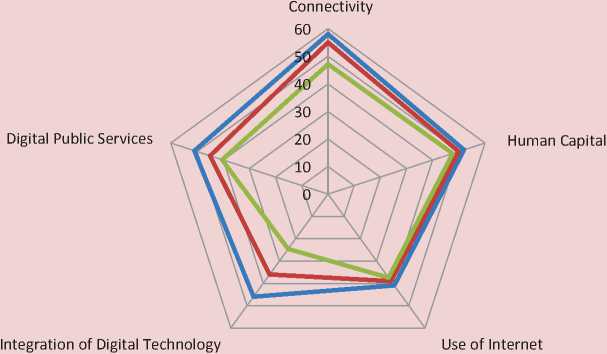
^^^^^■^2017 ^^^^^™ 2016 ^^^^^™2014
Source: own elaboration.
Figure 14. Croatia’s performance in the Digital Economy and Society Index in 2017, 2016 and 2014
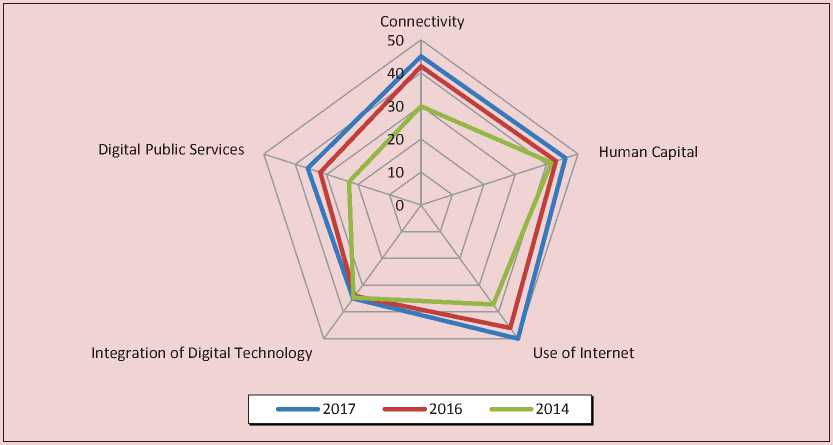
Source: own elaboration.
Despite the generally positive assessment of the level of information society development in the studied countries, one should look for ways to accelerate this development of Slovenia, Croatia and Poland. The basic role in this respect should be attributed to a necessary development regarding basic digital skills of the societies, to the raise of the demand for e-government services as well as the increase in investment outlays for telecommunications.
Especially the latter area is a desirable field of information society improvement
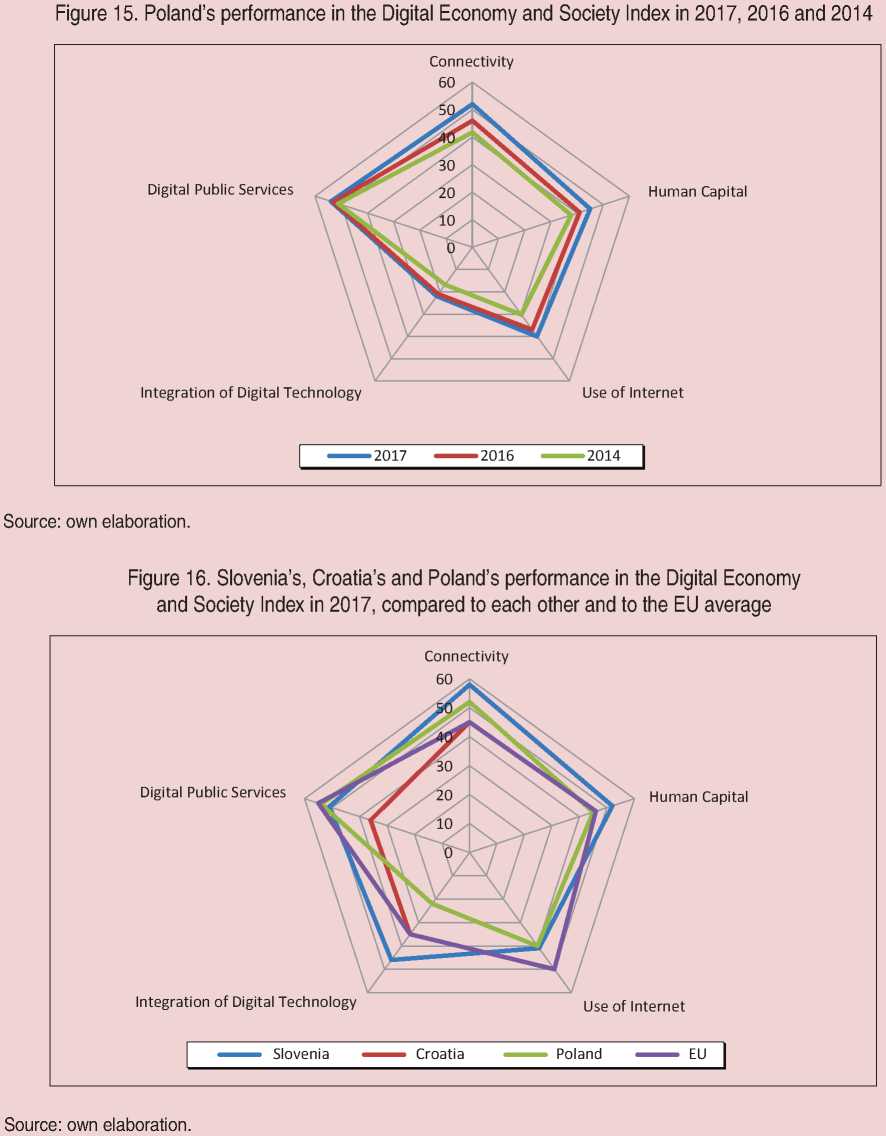
in all three researched countries. Despite a relatively positive assessment of the development of Slovenia, Croatia and Poland it is justified to increase telecommunication investments, especially in order to develop modern broadband networks that are the basis for the development of information society. Investments in broadband networks should be related to the influence of state authorities on:
– support for public funds from SMEs – development of e-administration, which interested in using modern broadband networks additionally encourages companies and house-and innovative information and communication holds to use broadband networks and innovative services, information and communication services.
Список литературы State of development of the information society in Slovenia, Croatia and Poland in comparison with the EU average
- Drucker P.F. Post-Capitalistic Society. Oxford: Butterworth-Heinemann, 1993.
- Toffler A. Trzecia fala. Warszawa: PIW, 1997.
- Olędzki J. Komunikowanie w świecie. Warszawa: Aspra-jr, 2001.
- Wright R. Nonzero. Logika ludzkiego przeznaczenia. Warszawa: Prószyński i S-ka, 2005.
- McLuhan M. Wybór tekstów. Poznań: Zysk i S-ka, 2001.
- Green J.O. Nowa era komunikacji. Warszawa: Prószyński i S-ka, 1999.
- Koyama K. Introduction to Information Theory. Tokyo, 1968.
- Kiełtyka L. Komunikacja w zarządzaniu. Techniki, narzędzia i formy przekazu informacji. Warszawa: Placet, 2002.
- Postman N. Zabawić się na śmierć. Warszawa: Muza S.A, 2002.
- Kerckhove de D. Inteligencja otwarta. Warszawa: Mikom, 2001.
- Kluszczyński R.W. Społeczeństwo informacyjne. Cyberkultura. Sztuka multimediów. Kraków: Rabid, 2001.
- Olędzki J. Komunikowanie w świecie. Warszawa: Aspra-jr, 2001.
- Goban-Klas T., Sienkiewicz P. Społeczeństwo informacyjne: szanse, zagrożenia, wyzwania. Wydawnictwo Fundacji Postępu Telekomunikacji. Kraków, 1999.
- Społeczeństwo informacyjne w Polsce. Wstęp do formułowania założeń polityki państwa. Krajowa Rada Radiofonii i Telewizji, Warszawa, July 1996.
- Kaku M. Wizje czyli jak nauka zmieni Świat w XXI wieku. Warszawa: Prószyński i S-ka, 2000.
- Goliński M. Społeczeństwo informacyjne -problemy definicyjne i problemy pomiaru. In: Conference proceedings „Polskie doświadczenia w kształtowaniu społeczeństwa informacyjnego. Dylematy cywilizacyjno -kulturowe", Kraków, 2001.
- Rogaliński P. Społeczeństwo informacyjne a dziennikarstwo obywatelskie. Available at: https://przegladdziennikarski.pl/spoleczenstwo-informacyjne-a-dziennikarstwo-obywatelskie-wywiad/(accessed 09.04.2018).
- European Commission, Digital Single Market. Available at: https://ec.europa.eu/digital-single-market/en/desi (accessed 12.04.2018).
- International Monetary Fund, World Economic Outlook Database, October 2017. Available at: http://www.imf.org (accessed 12.04.2018).
- List of countries by area. Available at: https://en.wikipedia.org/wiki/List_of_countries_and_dependencies_by_area (accessed 12.04.2018).
- World Population Prospects. The 2017 Revision. United Nations. New York, 2017. Available at: https://esa. un.org/unpd/wpp/Publications/Files/WPP2017_KeyFindings.pdf (accessed 12.04.2018).
- Broadband Coverage in Europe 2013. Final Report. A study prepared for the European Commission, DG Communications Networks, Content and Technology by: IHS Markit and VVA Consulting. Available at: https://ec.europa.eu/digital-single-market/en/news/study-broadband-coverage-europe-2016 (accessed 29.03.2018).
- Broadband Coverage in Europe 2016. Final Report. A study prepared for the European Commission, DG Communications Networks, Content and Technology by IHS Markit. Available at: https://ec.europa.eu/digital-single-market/en/news/study-broadband-coverage-europe-2016 (accessed 29.06.2018).
- Broadband Coverage in Europe 2016. IHS Markit Study. Available at: https://ec.europa.eu/newsroom/document.cfm?doc_id=47090 (accessed 26.06.2018).
- Eurostat Database, Individuals -internet use. Available at: http://appsso.eurostat.ec.europa.eu/nui/submitViewTableAction.do, (accessed 28.06.2018).
- Digital Economy and Society Index (DESI) 2017. Available at: https://ec.europa.eu/digital-single-market/en/news/digital-economy-and-society-index-desi-2017 (accessed 26.06.2018).
- Eurostat Database. Individuals’ level of digital skills. http://appsso.eurostat.ec.europa.eu/nui/submitViewTableAction.do (accessed 20.08.2018).
- Eurostat Database. Employed ICT specialists. Available at: http://appsso.eurostat.ec.europa.eu/nui/submitViewTableAction.do (accessed 20/06/2018).

